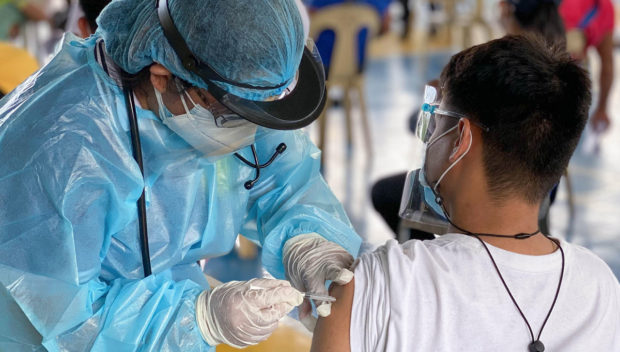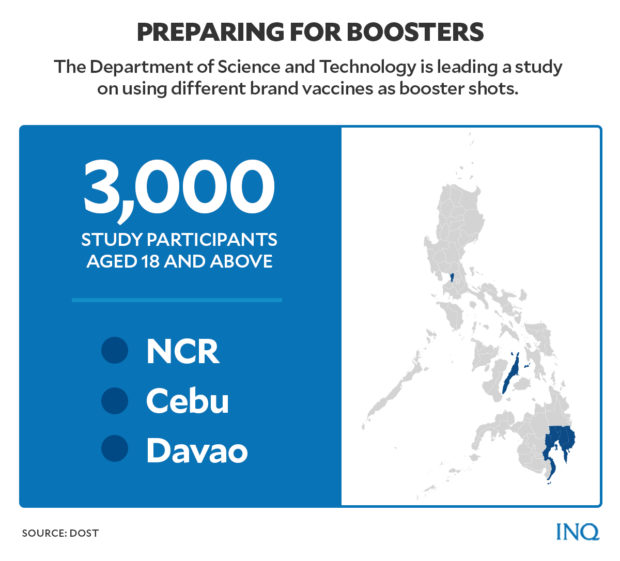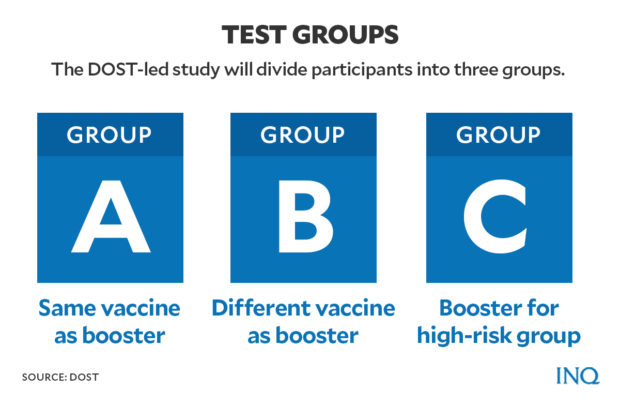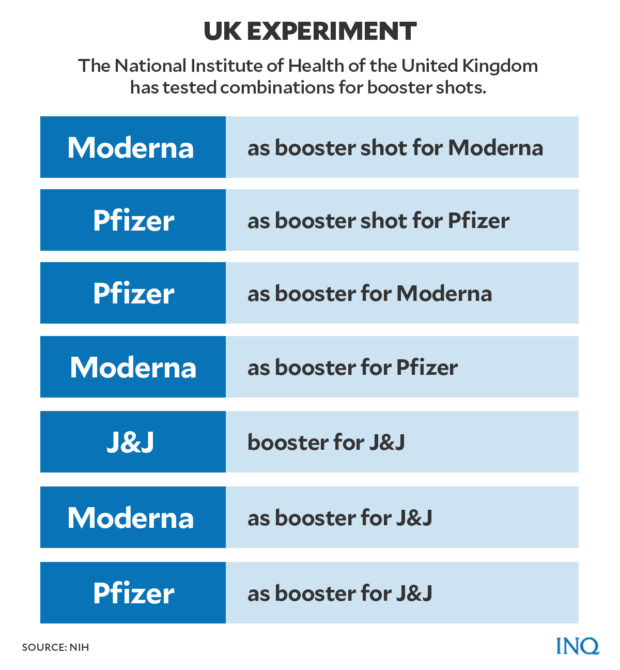As booster shots loom, mix and match of vaccines get closer look

FILE PHOTO. A health worker administers vaccine into a recipient in Ilocos Norte. PHOTO FROM Ilocos Norte GOV’T
MANILA, Philippines—As several countries across the globe — including the Philippines — prepare for what could be considered as a third dose of coronavirus vaccines, or booster shots, more are starting to weigh in on mixing vaccine brands.
Last week, the United States (US) and the Philippines unveiled plans to mix and match vaccines for the third dose.
Here’s what you need to know about these recent vaccination updates.
Mix and match in US
Last week, aside from an expanded booster vaccination campaign — which authorized booster doses of vaccines from Moderna and Johnson & Johnson — both the US Food and Drug Administration (FDA) and the US Centers for Disease Control and Prevention (CDC) have signed off on vaccine mixing for booster doses.
This authorizes the “mix and match” strategy for those who are eligible for a booster shot.
Article continues after this advertisementMeaning, eligible recipients in the US can now choose from vaccines by Pfizer, Moderna, or Johnson & Johnson for their booster shots. Their chosen vaccine brand may not necessarily match the brand used during their initial inoculation or for their first two doses.
Article continues after this advertisementREAD: US CDC backs off on Moderna, J&J mix-and-match COVID-19 vaccine booster shots
“Eligible individuals may choose which vaccine they receive as a booster dose. Some people may have a preference for the vaccine type that they originally received, and others may prefer to get a different booster,” the CDC said in a statement.
“CDC’s recommendations now allow for this type of mix and match dosing for booster shots,” it added.
The US FDA said that it “has determined that the known and potential benefits of the use of a single heterologous booster dose outweigh the known and potential risks of their use in eligible populations.”
READ: US authorizes ‘mix and match’ Covid vaccine boosters
Earlier this year, the CDC issued an updated guideline allowing the mix of Pfizer-BioNTech with Moderna vaccines only in “exceptional situations” since both brands use messenger RNA (mRNA), which is supposed to generate protein production by cells to trigger immune response.
This was before booster shots were authorized.
READ: PH joining global study on mixing vaccines amid uncertain supplies
PH trials
In the Philippines, vaccine mixing is not yet authorized for eligible individuals.
However, Science Secretary Fortunato de la Peña said the study on the mixing of vaccines was “ready to start” and the department was only waiting for approval by the Philippine FDA.
The multi-site study, according to De la Peña, will be conducted in eight venues—National Capital Region (NCR), Cebu and Davao.
It was expected to have at least 3,000 participants aged 18 years old and above.
The participants will be divided into three test groups, with a total of 12 study arms.
De la Peña, in his weekly report aired last Oct. 22, detailed that:
Group A—to receive booster vaccine with the same brand as their first two doses
Group B—to be studied for a mix of vaccines as booster shots
Group C—for study as special high-risk group receiving booster shots
The study will be led by Dr. Michelle de Vera of the Philippine Society for Allergy, Asthma, and Immunology (PSAAI).
The “unblinded trial” on vaccine mix and match “will determine the safety and immunogenicity of completing the vaccination series with available COVID-19 vaccines in the Philippines to those given Sinovac as the first dose,” said the science secretary.
De la Peña said a total of 400 Sinovac doses have so far been delivered to the Marikina City site for the study.
A dry run for the mix-and-match clinical trials was also held in Marikina last Oct. 18.
Another dry run will be held on Oct. 25 in Muntinlupa City and Davao City on Oct. 25 and 29.
READ: DOST starts clinical trials for ‘mix-and-match’ COVID-19 vaccines
The vaccine mixing study by the DOST has been initially planned for June.
The expected start for the project was then pushed back to July but the study was not able to secure a clearance from the FDA.
READ: PH joining global study on mixing vaccines amid uncertain supplies
In July, the Department of Health said only one brand of vaccine should be made available per vaccination center to prevent vaccine mix-ups.
“Per vaccination site, there should only be one type of vaccine there. We cannot have two types of vaccines in a vaccination site because that will lead us to these kinds of errors,” said DOH spokesperson Ma. Rosario Vergeire.
READ: DOH: Follow one vaccine brand per jab site rule to avoid mixing shots
Vaccine mixing studies
Several studies have already been conducted outside the Philippines, which tested the efficacy of mix and match regimens in preventing SARS-CoV-2, the virus that causes COVID-19.
The studies were conducted earlier this year when several countries have partially or completely halted the use of the vaccine developed by the pharmaceutical company AstraZeneca due to cases of blood clot events and deaths in Europe.
Those who have received one dose of the AstraZeneca vaccine in countries that suspended the shots have received a second dose of vaccine developed by a different pharmaceutical company.
A study, called the Com-Cov vaccine trial, led by the Oxford Vaccine Group in the UK, tests the use of different vaccine combinations for the first and second doses.
Initial findings released last May 12 in The Lancet, a highly-respected medical journal, showed that individuals, who got Pfizer shots followed by shots made by AstraZeneca, or vice versa, were more likely to experience mild to moderate symptoms of COVID-19.
The study found that the 830 participants — who were given either a double dose of the AstraZeneca vaccine or the Pfizer-BioNTech vaccine four weeks apart or a mix of both — have achieved a robust immune response against COVID.
The study also noted that the combination of the first dose of AstraZeneca vaccine followed by Pfizer-BioNTech vaccine has induced higher antibodies and T-cell responses than the combination of Pfizer-AstraZeneca.
The same finding was also reflected in a separate study run by Spain’s state-backed Carlos III Health Institute.
Preliminary results released on May 18 found that administering Pfizer vaccines to those who have already received AstraZeneca as the first dose was safe and highly effective
READ: https://www.thelancet.com/journals/lancet/article/PIIS0140-6736(21)01420-3/fulltext
A study conducted by epidemiologist Peter Nordström and his co-authors from the Umeå University in Sweden found that a dose of AstraZeneca vaccine followed by a dose of mRNA vaccine—either by Pfizer-BioNTech or Moderna—could provide better immunity against COVID, including against the highly-transmissive Delta variant.
READ: https://www.thelancet.com/action/showPdf?pii=S2666-7762%2821%2900235-0
Mismatched booster shots
The National Institute of Health (NIH) in the UK has conducted its own mix-and-match vaccine study. The preliminary results, which is not yet peer-reviewed, were released online last week and are now under review by the US FDA’s Vaccines and Related Biological Products Advisory Committee.
Here are some of the key details about the study:
- Some 450 individuals who have received a full series of any of the three vaccines authorized in the US—Pfizer-BioNTech, Moderna, and Johnson & Johnson—were recruited for the study.
- Three months after completing their initial inoculation doses, the participants were given a booster shot, which was either of the same brand or a different one from what they initially received.
- The researchers observed the individuals’ blood antibody levels 15 days after the booster shot.
The NIH study observed several combinations for booster shots. These included:
- Moderna – Moderna (booster shot)
- Pfizer – Pfizer (booster shot)
- Moderna – Pfizer (booster shot)
- Pfizer – Moderna (booster shot)
- Johnson & Johnson – Johnson & Johnson (booster shot)
- Johnson & Johnson – Moderna (booster shot)
- Johnson & Johnson – Pfizer (booster shot)
The NIH study noted that the highest increase in antibody levels was found in individuals who have received Moderna as a booster shot after getting two full doses of the same vaccine brand.
Those who initially received the Pfizer vaccine and were given Moderna as a booster shot saw a 32-fold rise in their antibody levels.
The next highest increase was from those with the Moderna-Pfizer combination, while the Pfizer-Pfizer combination has a 20-fold boost in antibodies.
The study also found that a second dose of Johnson & Johnson as a booster shot for the same vaccine brand only produces a fourfold increase in antibody levels.
For individuals who initially had Johnson & Johnson, the study results suggested Moderna as a booster shot after a 76-fold increase in antibody levels.
Johnson & Johnson-Pfizer combination, on the other hand, had a 35-fold increase in antibody levels.
The study found no safety concerns with the mixing and matching of certain vaccine brands. However, researchers noted limitations, including the study’s size.
TSB
For more news about the novel coronavirus click here.
What you need to know about Coronavirus.
For more information on COVID-19, call the DOH Hotline: (02) 86517800 local 1149/1150.
The Inquirer Foundation supports our healthcare frontliners and is still accepting cash donations to be deposited at Banco de Oro (BDO) current account #007960018860 or donate through PayMaya using this link.


